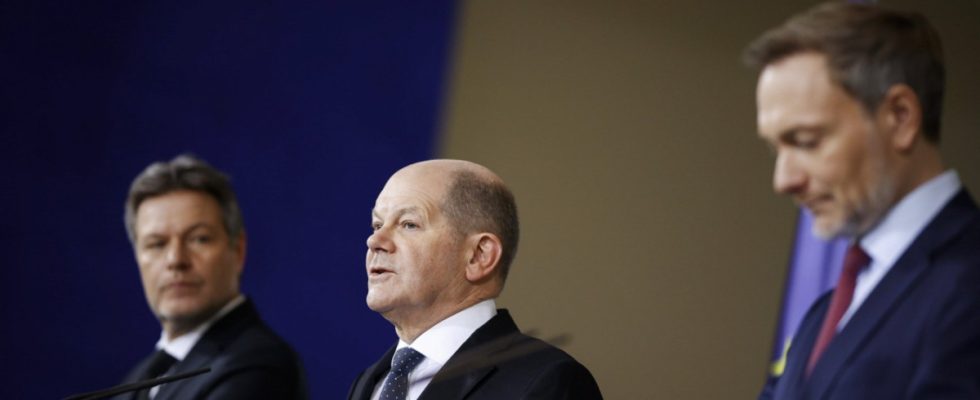The traffic light government wants to comply with the debt brake next year – at least for the time being. This was announced by Chancellor Olaf Scholz (SPD), Economics Minister Robert Habeck (Greens) and Finance Minister Christian Lindner (FDP) after they agreed on the 2024 federal budget that night. “We have to get by with significantly less money,” said Scholz and announced savings in several areas.
Scholz’s first point was the reduction of climate-damaging subsidies, which, according to Finance Minister Lindner, should save expenses amounting to three billion euros. The CO₂ price, for example, is expected to rise. The aim is to return to the “path of the grand coalition” that had decided on the instrument at the time, said Economics Minister Habeck. Accordingly, the price will rise next year to 45 euros per ton for companies, which will then pass on the additional costs to consumers. The planned billion-dollar subsidy for network fees is to be canceled. The fees are part of the electricity price and are intended for expanding the network. Heating, refueling and electricity are likely to become significantly more expensive overall. In addition, plastic and kerosene will be taxed on domestic flights in the future. “We don’t like to do that, but it’s necessary,” said Scholz, referring to the savings.
The climate and transformation fund, which is used to promote the transformation into a climate-friendly economy, will also be cut. The pot remains in place, but is to be reduced by twelve billion euros. Habeck said the budget ensures that the restructuring of the economy can continue. The expansion of a hydrogen network and the promotion of the semiconductor industry are continuing.
There should be no cuts in the social sector, as Lindner assured. “People in emergency situations are not the ones who suffer from the current situation,” said a coalition paper. However, Lindner indicated that they wanted to make the welfare state more efficient. They want to save 1.5 billion euros by integrating refugees from Ukraine into the labor market.
The announced doubling of military aid to Ukraine also remains in place. The eight billion euros are to be anchored in the 2024 budget.
The agreement was preceded by a weeks-long dispute, triggered by the Federal Constitutional Court’s ruling in November, which declared booking techniques in the 2022 budget to be unconstitutional. In a hastily passed supplementary budget for 2023, the traffic light again suspended the debt brake. The budget for 2024 was also in jeopardy after the verdict. The main point of contention was the question of whether the debt brake should be adhered to next year or suspended again, especially since Finance Minister Lindner identified a budget gap of 17 billion euros.
Flood disasters or the situation in Ukraine could justify a new emergency situation
After the agreement, Lindner said: “This coalition is capable of acting and reaching agreement, even on very difficult tasks.” Chancellor Scholz also praised the talks as “constructive” and “familiar”. In the Bundestag he spoke of “hard work”, which resulted in a “good budget”. Economics Minister Habeck called the solution “solid”.
The traffic light politicians emphasized that they would return to the debt brake next year, but they kept a back door open. In a government statement in the Bundestag, Scholz said that in emergencies comparable to the flood disaster in the Ahr Valley in 2021, debts above the brake would be taken on. They are already looking into making an exception to the debt brake for 2.7 billion euros in aid payments for those affected in the flood area. The situation will also be reassessed in the event that the situation on the front in Ukraine worsens. The same should apply to the scenario if other major donors to the country attacked by Russia cease to exist – such as the USA.
In his government statement, Scholz also explicitly held the Bundestag responsible. If the government comes to the conclusion that it needs to reassess the budget situation, a resolution to exceed it will be brought to parliament.
There was strong criticism of this from CDU parliamentary group leader Friedrich Merz. He accused Scholz of consciously taking this scenario into account. Scholz knows that the 2024 budget cannot be met with the debt brake and is already planning an emergency to suspend the brake again, said Merz. The law provides for an exception to the debt brake in the case of unforeseen emergencies, not those that are announced months in advance. “We won’t let you get away with this trick,” said Merz.
Despite the agreement, the year 2024 will start with a provisional budget. Discussion and adoption in the Bundestag will not be possible until January at the earliest.

